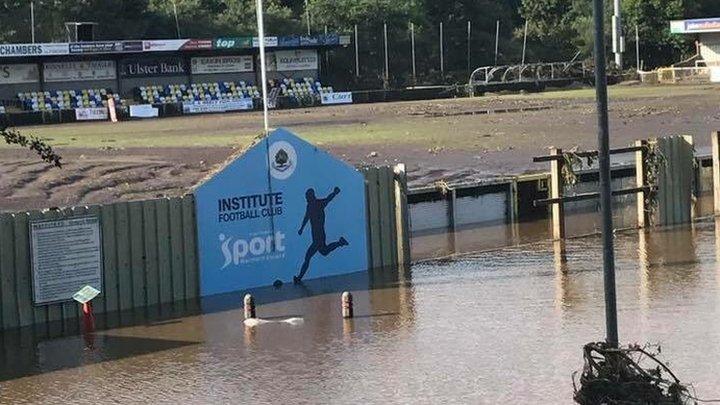Irish Premiership: Fire and flood fail to thwart high-flying Institute
- Published
Institute's Riverside Stadium suffered extensive flooding in August 2017
Storm clouds unleashed an unrelenting torrent and when the River Faughan burst its banks a nightmare began for little Irish League club Institute.
Flood water quickly swamped the adjacent and aptly-named Riverside Stadium, swirling seven feet deep on a late summer night in 2017.
The water's weight and power twisted the pitch into crinkled heaps and left a thick layer of sediment in its wake.
This was not a temporary setback for Institute - insurance could not be gained for any possible future flooding, signalling the end of the Riverside Stadium.
The ambitious north-west club had pumped £2 million into upgrading the ground, including small stands on all four sides, and a further blow came last month with the changing rooms destroyed in an arson attack.
Japanese knotweed continues its invasive march in waist-high growth on a once pristine playing surface while a bass drum, emblazoned with the club name and crest and with its skin violently slashed, lies abandoned as a symbol of eerie decay.
Adversity can demoralise or inspire, and it was the latter for Institute as the team fought its way to the Championship title despite the switch to a new and temporary "home" venue a few miles away.
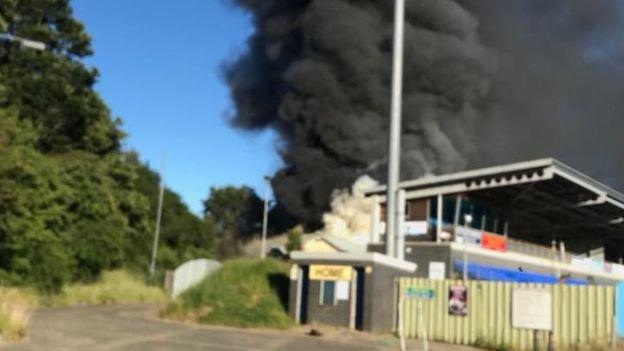
Thick smoke rises from the fire in the changing rooms behind the main stand
Promotion to the Premiership has provided an oasis of light and while the top-flight nomads face another short-term ground move, there is a sense of recovery and restored optimism.
"The flood left a scene of complete and utter devastation - the pitch had actually been lifted and moved by the water," said Institute chairman Bill Anderson.
"Some of the players also had their homes flooded and we were trounced 6-1 at Ballyclare Comrades a couple of days later. The bus on the way back was like a morgue and everyone was wondering where we would go from here.
"I said to people we either see this as an opportunity or we see it as a disaster, and depending how we see it will determine how we respond. So we kind of turned it around although it is the football, following an absolutely tremendous season, where the hope springs from.
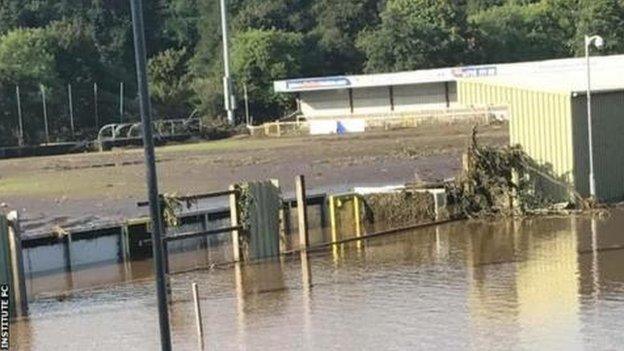
The flood waters begin to recede at the Riverside Stadium but the pitch is destroyed
Mental strength
"We've been in existence since 1905 and we're a resilient club with resilient people. The fire was heart-breaking and felt like another nail in the coffin even though we were still riding high on the adrenalin of getting promotion."
Geography can be everything in a divided land and the location of Institute's home for the 2018/19 season presents another test for the club.
Institute, based in the village of Drumahoe on the outskirts of the Waterside area of Londonderry, has a mainly Protestant support base.
The move to the revamped Brandywell Stadium, home of League of Ireland side Derry City, lies across the River Foyle in the predominantly Cathlolic Cityside.
There are obvious concerns relating to Institute fans coming into the area along with fears of sectarian trouble flaring when supporters of visiting clubs descend on the ground.
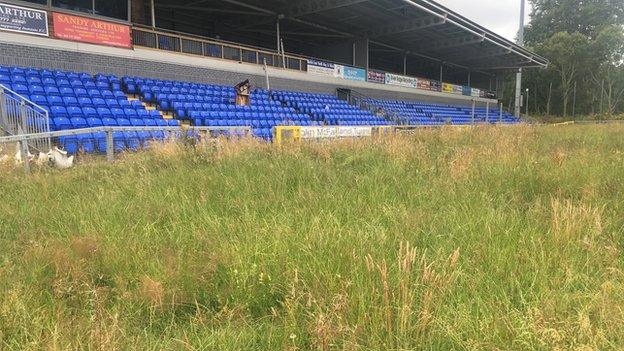
A scene of dereliction as long weeds grow in front of the main stand at the Riverside Stadium
It's a city scarred by the Troubles - Derry withdrew from the Irish League in the early 1970s because of the security situation while Institute's move to the Riverside Stadium in 1980 came after its Cityside social club was damaged in an explosion.
"There are sensitivities associated in going to the Brandywell on both sides of the community," added Anderson.
"I've been having meetings and discussions with various representatives of the Waterside community and everybody has been tremendously supportive.
"Local politicians have also been supporting while the people of the Cityside have been very welcoming up to this point.
"We've discussed a number of sites for a new stadium with the council and we are now focusing on one.
"We'll have to bring in sponsors and funds but with a bit of luck we should be rebuilding again in two or three years in the heart of the Waterside."
Close connection
Moving to the Brandywell is viewed as an opportunity by Institute manager Paddy McLaughlin, a former Derry City player who lives and owns a shop close to the stadium.
McLaughlin was at the Institute helm for just three months when the calamity of 22 August unfolded.
But the 37-year-old was no newcomer to the club, coming through as a player, captain and assistant manager before taking charge.
McLaughlin had to contend not just with the ensuing turmoil off the pitch, but lifting a team which had been beaten in the play-off for a Premiership spot in the last two seasons.
However, there was no play-off required this time as Institute won the Championship crown by nine points to secure automatic promotion.
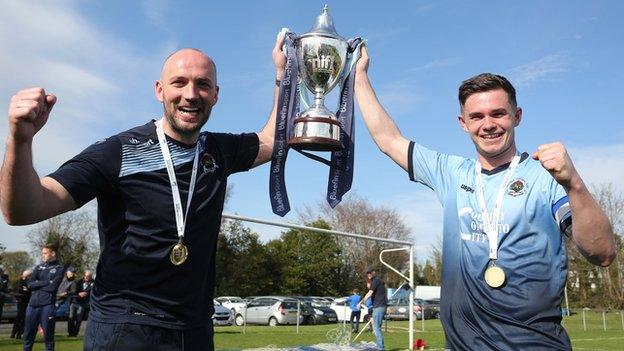
Institute boss Paddy McLaughlin and captain Michael McCrudden celebrate winning the Championship in April
A team which has spent most of its existence in the junior ranks is now back among the Northern Ireland elite after a three-year absence.
"We assembled at the ground after the flooding - I thought it was probably the end of the club and it was going to be a very short tenure for me," said McLaughlin.
"But the players were fantastic considering the obstacles put before them and we definitely used it as a motivational tool. It was us against the world.
"And, after the disappointment of missing out in the play-off the previous two years, they were so determined to get over the line this time, especially to go up as champions.
"There's a lot of good football people from around the city who are looking forward to coming to the Brandywell and watching Institute for the first time, The more the merrier as it will give the team a lift.
"For any team getting promoted you are going to be up against it to stay up but we were written off last year from day one and did alright - this is a team of young, exciting players with no fear."
- Attribution
- Published23 June 2018
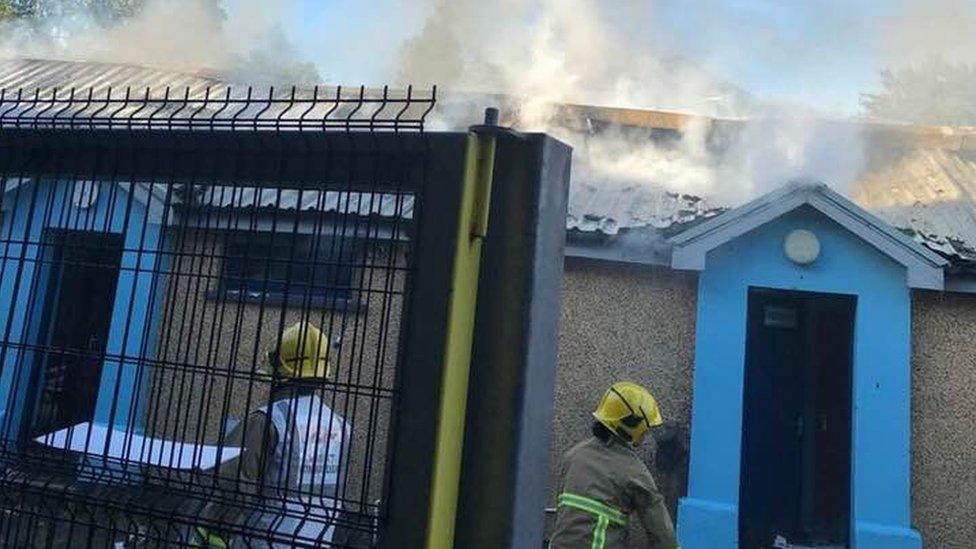
- Published21 April 2018
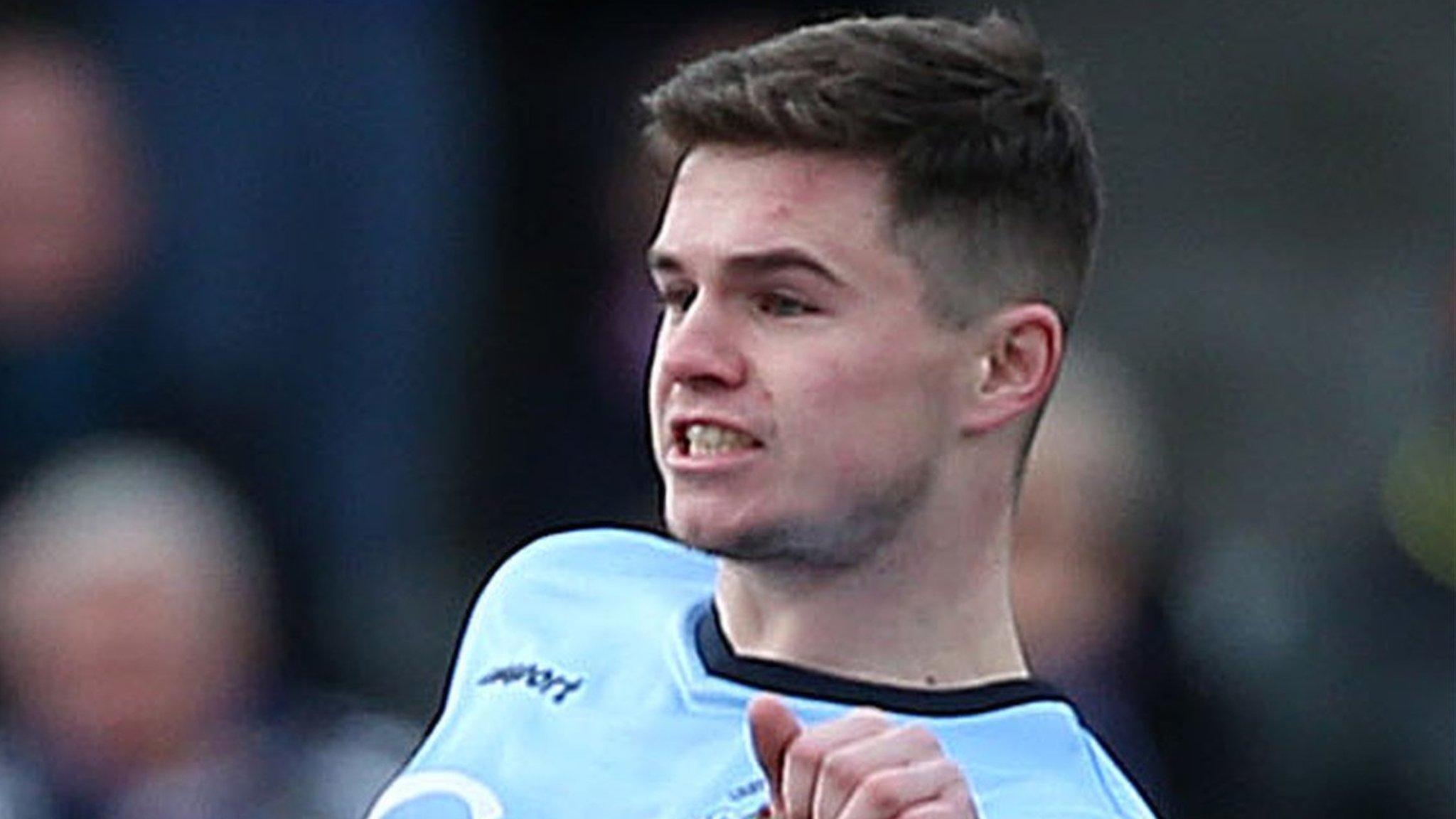
- Attribution
- Published28 November 2017
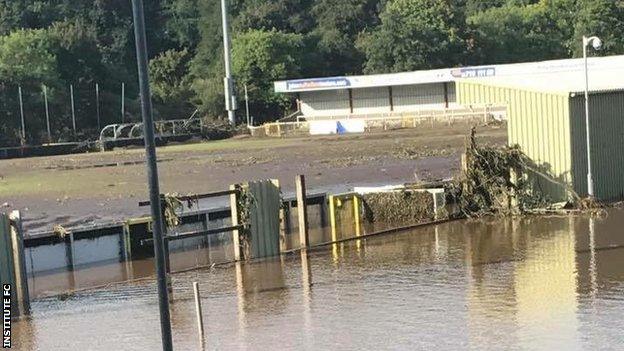
- Published23 August 2017
